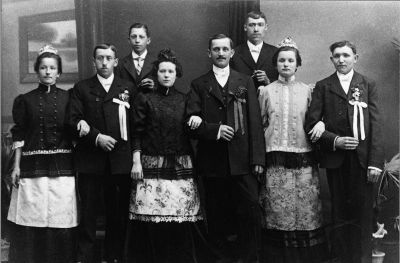Hamburg: Little Warsaw

Around this time secular associations began to arise. The “Klub Polski” was set up in 1887 and changed its name to “Nadzieja” (Hope) in 1888: it avoided political and religious matters and was more of a social club. At that time a Polish “Sokół” (Falcon) gymnastics club was almost obligatory and one was set up in Wilhelmsburg in 1905. Other clubs and organisations were mainly for women. As early as 1885 Polish women set up a club called “Wieniec” (Garland); this was followed by other clubs called “Wanda”, “Cecylia”, and “Halka”. Such clubs were mainly concerned with keeping up the Polish language and culture. All in all it might be said that Polish women were much more active than their men folk. In 1922 Polish women’s clubs in Wilhelmsburg had a total of 605 members. By comparison, the “Sokół” only had fifty. Club life played a central role in upholding the national and cultural identity of the Poles in Wilhelmsburg. One out of every two Polish immigrants in Wilhelmsburg belonged to Polish clubs before the First World War.
At the end of the First World War the situation for the Polish inhabitants and also for the “Prussian Poles” living in Germany changed radically. After 123 years without an independent state, the Polish Republic was proclaimed on 11th November 1918. According to article 91 of the Treaty of Versailles, signed on 28 June 1919, Poles in Prussia were duty-bound to decide whether they wished to retain German nationality or adopt Polish nationality and move to Poland. In fact they were able to make their choice until 1922. The majority of Polish immigrants opted for the Polish state. Wilhelmsburg was never again as Polish as it was in 1922. Today there is not much left to be seen of “Small Warsaw” in the old “Alte Schleuse” street. Nevertheless Wilhelmsburg is now a multicultural district, half of whose population are migrants. The names on the doorbells have been strongly “Germanised”: in addition, “Wischynsky” and “Pschybilla” occur at least as often as Turkish names like “Ölmez” and “Çiftçi”. Nowadays you cannot only witness traces of “old” Poland in the Hamburg suburb of Wilhelmsburg. The once so Polish locality is now attracting new Polish migrants like magic. Perhaps there is something Polish in the air in old “Small Warsaw”.
Adam Gusowski, March 2016
Additional information:
The passionate pleas of the Polish inhabitants of Wilhelmsburg in their dispute with the Episcopal Ordinariate to ensure that pastoral care be given in their native tongue is documented in a letter written in 1896: “Most venerable Sir! We should like to inform you that your sermon last month on 26th April can in no way satisfy us […] In the first place you are the very person who aggravates us the most. […] Here it is clearly only about working for money instead of eternal bliss […] Only because of money have you done everything possible to ensure that no Polish pastoral care can be allowed. Please do not think that we are not weighed down by the way you expressed yourself here, in words unfit for a house of God: "If it doesn’t suit you, you can look elsewhere". Here we should like to ask you where we should look? You are not an employer in a position to offer such a thing. Our employers themselves want us to find satisfaction in our church, and for this we should thank the directors of the wool combing works and no one else; for you know that we are grateful to them for our work. We would feel even more grateful if a Polish priest were here […] Yes indeed, Germanisation and moneybags now have priority. Why were the Holy Ghost and the apostles sent down to earth? Certainly not because of Germanisation, otherwise that would not have been necessary. Why were missionaries taught so many languages before they could preach the truth to heathens? And why should we not experience our mother tongue in God’s house? Because God clearly failed to create Polish people? […] Your fine sermon has thoroughly inflamed our spirits and we are not as satisfied as you clearly think. You will be hearing more from us if things don’t change soon; over the past four years we have been collecting dossiers crammed full of notes about what has been going on here […] Germanisation must at least be abolished in the church, […] For there before the throne of the Almighty everyone shall find full contentment rather than provocation […] Last not least we trust you will not forbid us to pray in our mother tongue, as Herr Rektor Wedig has forbidden the children and insulted our songs as Polish rubbish . […] Yes, father, the sweaty pfennigs you get from here were intended for a Polish priest, yes we even put it in writing. Since he has not now received them, it is as if they have been stolen. You will bear a heavy rock upon your breast until your final hours. We need a Polish priest here; you know that all too well. Now you will never be able to say I did not know. Today we wish to close with the following words: you have a huge responsibility, an enormous responsibility. Signed by the Polish citizens in Wilhelmsburg.”




![Kleinwarschau [Little Warsaw] in Hamburg - radio play in German Kleinwarschau [Little Warsaw] in Hamburg - radio play in German - In co-operation with ‘COSMO Radio po polsku’ we present radio plays on selected topics of our portal.](/themes/porta_polonica/assets/images/audio.jpg)



